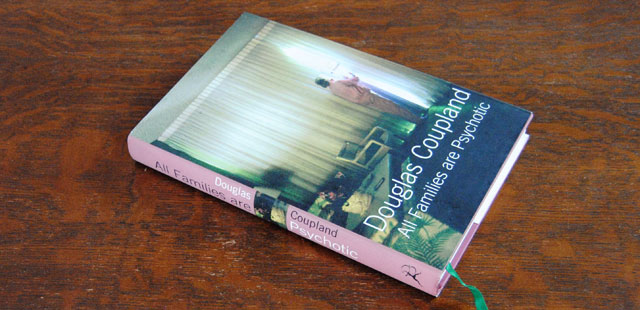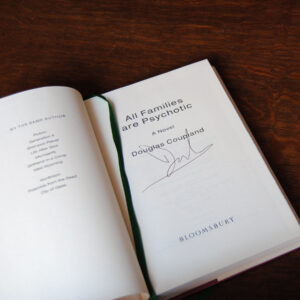
In All Families are Psychotic, author Douglas Coupland creates a sort of funhouse mirror of what family life is like. Sure, it’s often distorted and even frightening, perhaps, but there remains an element of our own truth staring back at us.
Before we establish why Coupland’s fictional examination of family life is worth your time, let’s discuss what this book is about.
“The Drummond family, reunited for the first time in years, has gathered near Cape Canaveral to watch the launch into space of their beloved daughter and sister, Sarah. Against the Technicolor unreality of Florida’s finest tourist attractions, the Drummonds stumble into every illicit activity under the tropical sun – kidnapping, blackmail, gunplay, and black market negotiations, to name a few.”

Author Douglas Coupland
That’s the backdrop to this novel, and once you’ve read it, you realize it feels very much like a play. The settings may be varied, but the centerpiece to the novel is conversation, flashback storytelling, and inner-monologue from some of the main characters.
That all brings me to reason number one of why this book should be on your shelf: This is a real family. The Drummonds are, for the most part, the absolute unluckiest lot as far as fictional families go. They completely understand, however, what parts are their fault and what are not. Their mood or circumstance also determines what they dwell on.
This undoubtedly brings me to the second reason that you should get this book: it’s a genuine snapshot into humanity. Humanity isn’t perfect. We’re flawed in many many ways, but Coupland has created some immensely honest characters amid a plot that even daytime TV might pass on.
For me, it boils down to a statement that Sarah tells her brother Wade twice throughout the book: “I think doing things is easier than not doing things.” Approximately 50pages later, Sarah tells him “There are simply these things that need to be done, and it’s simpler to do them than to not do them.” Coupland spent a good portion of those pages explaining Wade’s inaction. As we examine the lackadaisical ways of the Drummonds’ oldest child, we see the exact opposite trait in those around him. Inaction is painted as being the easy way out.
And for me that’s not a contradiction; it’s an affirmation of character. It’s who the characters are now, and during the flashback stories, it’s why they were who they were.
That all brings me to my third and final reason for picking up this book for yourself: Coupland’s mighty pencil as a cultural critic is as sharp in this book as it is in Generation X, Shampoo Planet, or Microserfs.

A signed copy of All Families are Psychotic
He dives into the relevant stories of the time from when this book was set and published; 2001. Topics and issues that would have made the nightly news included thalidomide, AIDS, born-again Christianity, drugs, divorce, and the early Internet, which is a place that seems out of time from the hindsight of decades. Coupland’s philosophical self is a massive part of this novel.
There’s a soliloquy on time that I adore buried in its pages.
“Where did the past six minutes go? When time is used up, does it go to some kind of place like a junkyard? Or down a river like the waters beneath Niagara Falls? Does time evaporate and turn into rain and start all over again?”
To the point of the title, there’s the titular quote. “All families are psychotic, Wade. Everybody has basically the same family — it’s just reconfigured slightly different from one to the next.”
If any of this intrigues you, go pick up a copy of All Families are Psychotic by Douglas Coupland. If not, perhaps you’d be interested in one of his earlier works. Coupland’s musings within the pages of his novels are, at least to me, worth the price of admission.
Happy reading.
Read the Secret File of technical information and quotes from All Families are Psychotic.